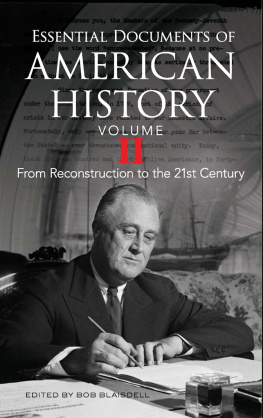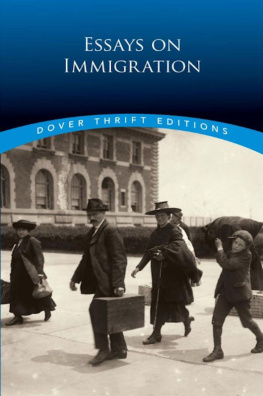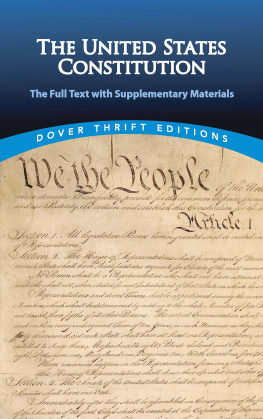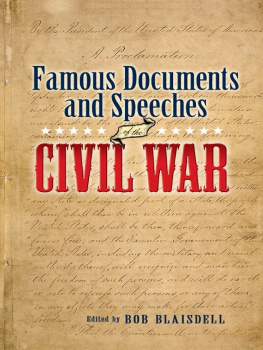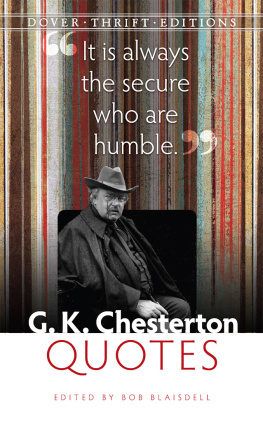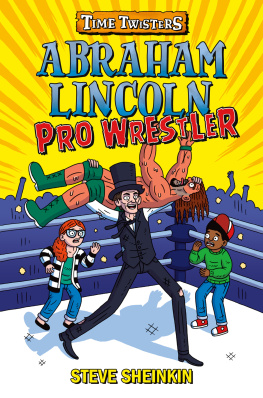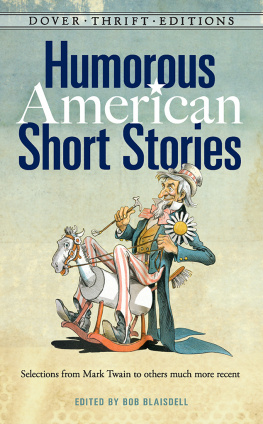DOVER THRIFT EDITIONS
GENERAL EDITOR: SUSAN L. RATTINER
EDITOR of THIS VOLUME: JIM MILLER
Copyright
Copyright 2013, 2016 by Dover Publications, Inc.
All rights reserved.
Bibliographical Note
Lincoln: A Book of Quotations, first published by Dover Publications, Inc., in 2016, is a republication in a new format of the text from Abraham Lincolns Wit and Wisdom, originally published by Dover in 2013.
International Standard Book Number
ISBN-13: 978-0-486-80607-5
ISBN-10: 0-486-80607-3
Manufactured in the United States by RR Donnelley 80607301 2016
www.doverpublications.com
NOTE
It is the strangest and yet the fittest thing in the jumble of human vicissitudes, that he, out of so many millions, unlooked for, unselected by any intelligible process that could be based upon his genuine qualities, unknown to those who chose him, and unsuspected of what endowments may adapt him for his tremendous responsibility, should have found the way open for him to fling his lank personality into the chair of state,where, I presume, it was his first impulse to throw his legs on the council-table, and tell the Cabinet Ministers a story.
Nathaniel Hawthorne, July 1862
Americas most famous and most mythologized man is, even with the myth stripped away, probably one of our greatest presidents and certainly one of our most remarkable and representative men. It is very strange that I, he reflected near the end of the Civil War, a boy brought up in the woods, and seeing, as it were, but little of the world, should be drifted into the very apex of this great event. How strange (and fortunate), indeed, it was that he, born in 1809 in the backwoods of Kentucky, raised on the frontier of Indiana, a self-educated lawyer in Illinois, found his way to state and then national politics and became, to his own amazement, the president of the United States at its moment of deepest crisis: the secession of rebel states over the issue of the extension of Americas most vile institution, slavery. He steered America, a house divided, as he famously described it, through its war upon itself, its war of brothers and families, and he was assassinated at its end in 1865. Only hours before he was fatally shot, he envisioned the peaceful and healing aftermath of the national and personal catastrophe, saying to his wife Mary, We must both be more cheerful in the future. Between the war and the loss of our darling Willie, we have both been very miserable. (One of their young sons had died of disease during the war.)
It is not a myth that Lincoln was wise and witty; his powerful and conversational phrasings continually demonstrate the workings of a lively, quick, and sensitive mind. It is very common in this country to find great facility of expression and less common to find great lucidity of thought, he told a British journalist. The combination of the two in one person is very uncommon; but whenever you do find it, you have a great man. Lincoln himself developed that combination, and he rose to become our great man. As a public man, he seems to have been generally consistent in his views on slavery, the law, and morality. Though I have distributed his statements into various broad categories, few of the quotations could not have found an appropriate home in another category or two. I have tried to limit the selection to quotations that were characteristic rather than odd or exceptional, and to rely on those statements that are more or less self-explanatory. I have arranged the quotations chronologically within their categories, with the undatable remarks placed thematically.
Most of the designated remarks (his statements recorded not in writing but in conversation) should be taken as secondhand. To help determine the reliability of such remarks, I have depended on the scholarship of Lincoln experts. During his presidency, Lincoln became famous as the purported author of many anecdotes he had never even told, much less created. I do generally remember a good story when I hear it, he told a friend during the Civil War, but I never did invent anything original; I am only a retail dealer. He became Americas model of the folksy joke-teller in spite of this, so I have included a few of the jokes he seems to have actually recounted.
While a fine writer, Lincoln was never a good speller, nor did he ever get around to memorizing rules of punctuation. With educated people, I suppose, punctuation is a matter of rule; with me it is a matter of feeling, he told a friend. But I must say that I have a great respect for the semicolon; its a very useful little chap. For the sake of clarity, I have corrected his punctuation and spelling. For this project (and its earlier, shorter incarnation in 2005), I thank my father, Dr. F. William Blaisdell, for the loan of his Civil War books and his suggestions of examples of Lincolns humor, and my son, Max, for his help in tagging the hundreds of quotations from The Collected Works. Maxs recent interest in collecting quotations about Lincoln by his contemporaries led to the Appendix, in this new edition, of observations and opinions on Lincolns character by his friends and foes.
Bob Blaisdell
New York City
September 2012
AMERICA
We find ourselves in the peaceful possession of the fairest portion of earth as regards extent of territory, fertility of soil, and salubrity of climate. We find ourselves under the government of a system of political institutions conducing more essentially to the ends of civil and religious liberty than any of which the history of former times tells us. We, when mounting the stage of existence, found ourselves the legal inheritors of these fundamental blessings. We toiled not in the acquirement of establishment of themthey are a legacy bequeathed us by a once hardy, brave, and patriotic but now lamented and departed race of ancestors. Theirs was a task (and nobly they performed it) to possess themselves, and through themselves, us, of this goodly land; and to uprear upon its hills and valleys a political edifice of liberty and equal rights; tis ours only, to transmit these, the former, unprofaned by the foot of an invader; the latter, undecayed by the lapse of time and untorn by usurpation, to the latest generation that fate shall permit the world to know.
The Perpetuation of Our Political Institutions: Address before the Young Mens Lyceum of Springfield, Illinois, January 27, 1838
At what point shall we expect the approach of danger? By what means shall we fortify against it?Shall we expect some transatlantic military giant to step the ocean and crush us at a blow? Never!All the armies of Europe, Asia and Africa combined, with all the treasure of the earth (our own excepted) in their military chest, with a Buonaparte for a commander, could not by force take a drink from the Ohio or make a track on the Blue Ridge in a trial of a thousand years.
At what point then is the approach of danger to be expected? I answer, if it ever reach us, it must spring up amongst us. It cannot come from abroad. If destruction be our lot, we must ourselves be its author and finisher. As a nation of freemen, we must live through all time or die by suicide.




